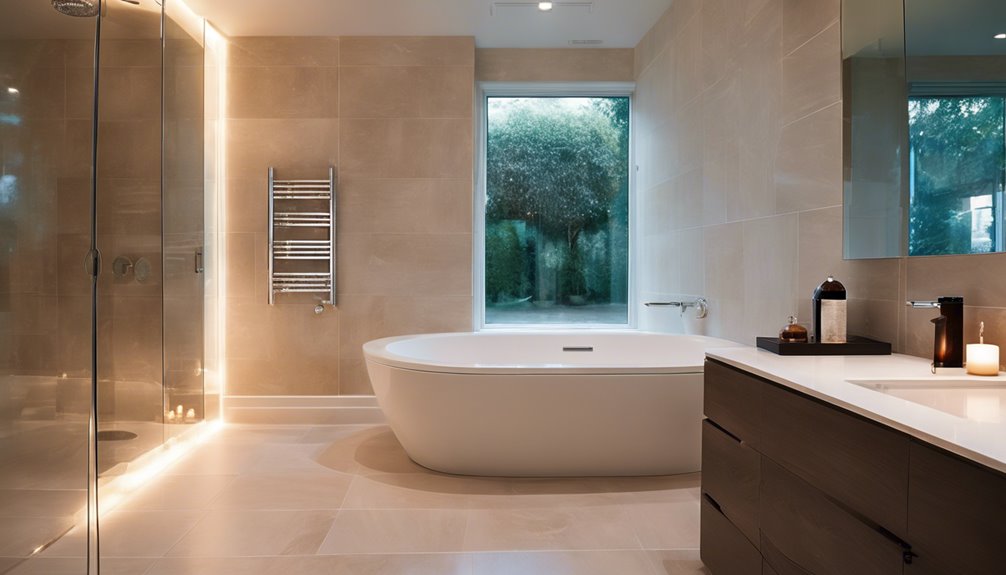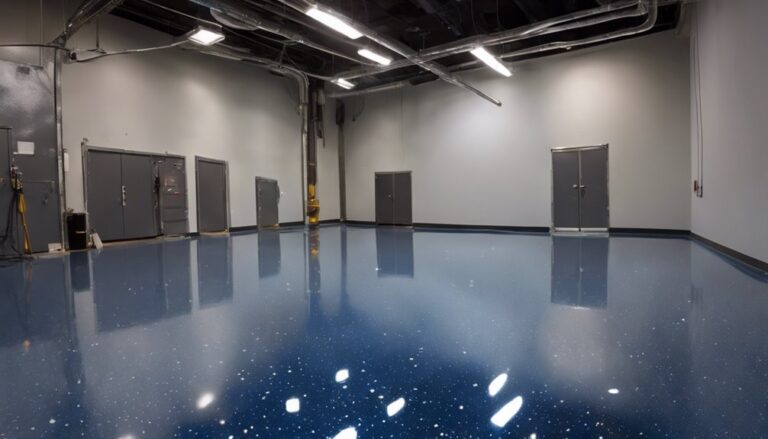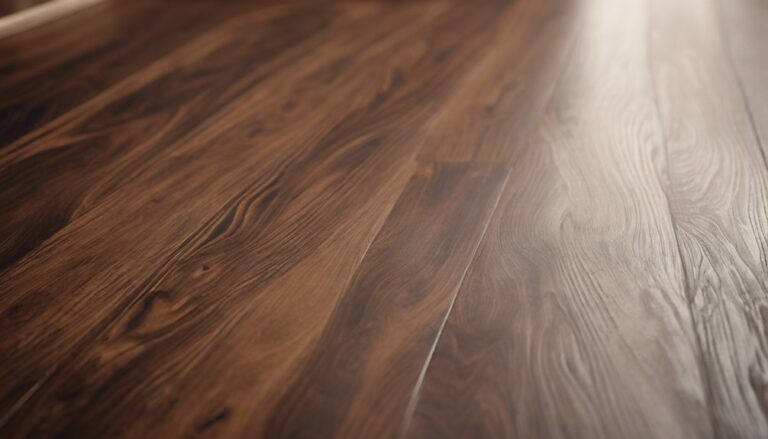Heated floors usually cost between $10 and $30 per square foot, but it varies based on system type and installation factors. Electric systems are often cheaper and quicker to install, making them ideal for smaller spaces. In contrast, hydronic systems are more efficient for larger areas but come with higher upfront costs. You'll also need to take into account materials, labor, and any electrical upgrades your home may require. Additionally, professional installation assures quality, while DIY could save you money if you're skilled. There's much more to take into account for budgeting and efficiency, which can enhance your decision-making process.
Types of Heated Flooring Systems
When you're considering heated flooring systems, it's essential to understand the different types available to find the best fit for your needs. There are two primary options: electric systems and hydronic systems. Electric systems use electric cables or mats installed beneath the floor, offering quick heat and easy installation in smaller areas. They're great for providing warmth instantly, making them ideal for bathrooms or kitchens.
On the other hand, hydronic systems circulate warm water through tubing under the floor. These systems are more energy-efficient for larger spaces but can involve a more complex installation process. Depending on your budget, space, and heating preferences, knowing these options helps you choose a system that enhances your comfort and freedom in your home.
Installation Costs Overview
Understanding the types of heated flooring systems lays the groundwork for evaluating installation costs. You'll find that the overall expenses can vary considerably based on several factors. Here's a quick breakdown of what to expect:
- Installation materials: Quality matters, and premium materials can hike up costs.
- Labor expenses: Skilled labor is essential for proper installation, impacting your budget.
- Square footage: The larger the area, the more you'll pay.
- Complexity of installation: Unique layouts or additional features can add to the total.
Factors Affecting Pricing
While you might expect a straightforward pricing structure for heated floors, several factors can considerably influence the final cost. First, the material quality plays a significant role; higher-quality materials often come with a higher price tag but can enhance durability and longevity. Next, system efficiency matters too. More efficient systems may require a larger upfront investment but can save you money on energy bills in the long run. Additionally, the size of the area to be heated will impact costs, as larger spaces require more materials and labor. Don't forget to take into account any necessary upgrades to your home's electrical system, which can also add to the overall expense. Being aware of these factors can help you make an informed decision.
DIY vs. Professional Installation
When considering heated floors, you'll need to weigh the complexity of installation against your budget. DIY installation can save you money, but it requires a solid understanding of electrical systems and floor layouts. On the other hand, hiring a professional can guarantee a seamless installation, though it comes at a higher cost.
Installation Complexity
Although many homeowners consider installing heated floors themselves, the complexity of the task often leads them to seek professional help. There are several installation challenges and labor requirements that can catch you off guard, including:
- Wiring complications – Understanding electrical systems can be intimidating.
- Subfloor preparation – Properly prepping your subfloor is essential for effective heating.
- System compatibility – Ensuring your chosen system works with your existing flooring can be tricky.
- Local codes and regulations – Maneuvering through these can be a headache without professional insight.
While DIY projects can offer a sense of freedom, the intricacies of heated floor installation often make hiring an expert the more practical choice. Ultimately, weighing your skills against the challenges will help you decide the best path forward.
Cost Considerations
Deciding between a DIY approach and hiring a professional for heated floor installation involves weighing not just your skill level but also the financial implications. If you choose to go the DIY route, you could save on labor costs, yet you'll need to invest time and effort into learning the installation process. This can impact your budget planning, especially if mistakes occur. On the other hand, hiring professionals guarantees expertise but can greatly increase your total costs. If your budget is tight, consider financing options that might make professional installation more feasible. Ultimately, think about your comfort level with the project and how much you're willing to spend for peace of mind in the installation process.
Long-Term Energy Savings
As you consider the installation of heated floors, it's important to recognize their potential for long-term energy savings. These systems can considerably reduce your energy bills while providing consistent comfort. Here are four long-term benefits to think about:
- Lower energy consumption: Heated floors operate at lower temperatures, reducing overall usage.
- Enhanced comfort: You'll feel warm underfoot, allowing you to lower your thermostat without sacrificing comfort.
- Increased home value: Modern heating solutions appeal to buyers, making your home more attractive.
- Durable performance: With proper installation, heated floors last longer than traditional heating methods, offering long-term savings.
Maintenance and Repair Costs
When it comes to heated floors, understanding maintenance and repair costs is essential for budgeting effectively. Routine maintenance is key to keeping your system running smoothly and can often be done by you. Regularly check for unusual noises and ascertain the thermostat is functioning correctly. If you notice any issues, addressing them early can save you from more costly repairs down the line.
When repairs are needed, hiring a professional is often the best route, but you can save money by doing minor fixes yourself. Familiarize yourself with basic repair tips, like checking for damaged wiring or leaks. Overall, budgeting for maintenance and unexpected repairs will help you enjoy the comfort of heated floors without financial stress.
Return on Investment
When considering heated floors, it's important to evaluate the return on investment. Not only can you enjoy energy efficiency savings on your utility bills, but these systems can also increase your home's value considerably. Ultimately, this means that your initial investment could pay off in both comfort and financial returns.
Energy Efficiency Savings
Although the initial investment in heated floors may seem substantial, the energy efficiency savings they offer can greatly enhance your return on investment over time. By reducing energy consumption compared to traditional heating systems, heated floors can lower your monthly bills and provide a cost comparison that's hard to ignore. Here are four reasons why you'll appreciate the switch:
- Consistent warmth without overworking your system.
- Reduced reliance on fossil fuels, giving you more freedom in your energy choices.
- Lower heating bills, freeing up cash for other wants.
- Enhanced comfort that makes your home a true sanctuary.
Investing in heated floors isn't just about luxury; it's a practical choice that pays off in comfort and savings.
Home Value Increase
Investing in heated floors can greatly boost your home's value, especially if you plan to sell in the future. Many buyers are drawn to the comfort and luxury of heated flooring, making your home more appealing during a home resale. In fact, homeowners typically see a solid return on investment, often recouping around 70% of installation costs. When it comes to value appraisal, heated floors can elevate your property's marketability, setting it apart from others lacking this feature. Additionally, they contribute to energy efficiency, enhancing your home's overall appeal. Ultimately, if you're looking to increase your home's value and create a cozy atmosphere, heated floors are a practical choice that can pay off when it's time to sell.
Frequently Asked Questions
How Do Heated Floors Affect Home Resale Value?
Heated floors can considerably enhance your home's resale value, especially in colder climates. They provide superior home comfort, making your space more inviting and enjoyable. Potential buyers often appreciate the energy efficiency these systems offer, as they can lead to lower heating bills. By showcasing these benefits during viewings, you could attract more interested buyers, ultimately increasing your chances of a successful sale and a better return on your investment.
Can Heated Floors Be Installed Under Any Type of Flooring?
Did you know that about 60% of homeowners find heated floors to be a desirable feature? When it comes to installation requirements, you can indeed install heated floors under various types of flooring, including tile, laminate, and some types of hardwood. However, flooring compatibility is key; guarantee the materials you choose can handle the heat without warping or cracking. Always consult a professional to guarantee you're adhering to best practices for installation.
Are Heated Floors Safe for Pets?
Heated floors are generally safe for pets, but it's important to take into account pet comfort. Most floor materials used for heated systems, like tile or laminate, don't pose a risk. However, make sure the temperature isn't too high to prevent discomfort. It's a good idea to monitor your pets' reactions, especially if they're sensitive to heat. As long as you keep the settings moderate, your furry friends can enjoy the warmth without issues.
What Is the Lifespan of a Heated Flooring System?
The lifespan of a heated flooring system can vary, but you can typically expect about 25 years with proper care. To maximize heating efficiency, choose high-quality materials and follow installation tips closely. Verify your system is installed by a professional and consider adding insulation to prevent heat loss. Regular maintenance also plays a vital role in extending its life. With these strategies, you'll enjoy a cozy, efficient, and long-lasting heated floor.
Do Heated Floors Work in Basements or Crawl Spaces?
Heated floors can be highly effective in basements and crawl spaces. In fact, studies show that well-insulated basements can retain heat up to 30% more efficiently. When considering heated flooring in these areas, it's essential to assess your basement insulation and crawl space considerations. Proper insulation guarantees that the warmth radiates effectively, providing comfort and energy savings. Just make certain to choose the right type of system for your unique space!




